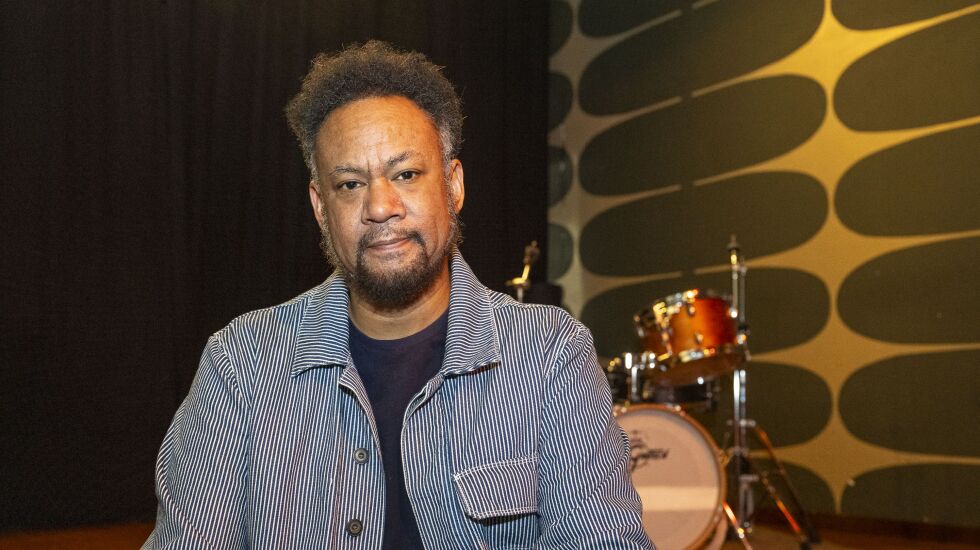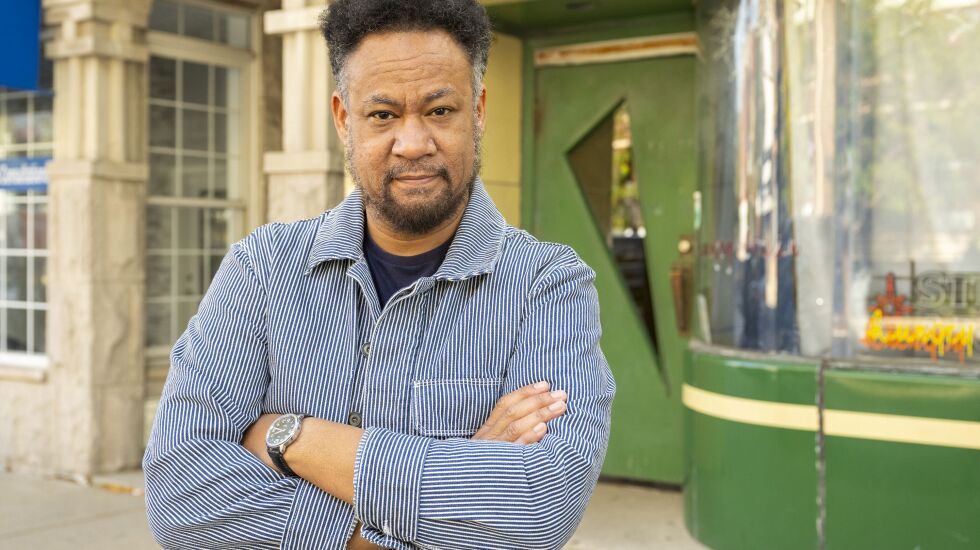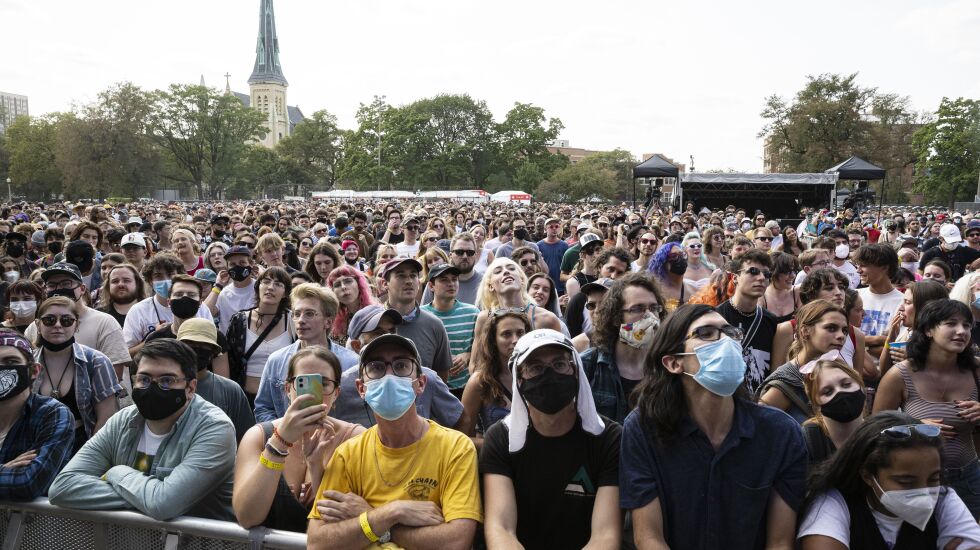
For more than 20 years, curator, producer, venue owner and musician Mike Reed has been an essential part of Chicago’s music scene, leaving his mark on multiple fronts.
Take the annual Pitchfork Music Festival in Union Park. As co-founder and director of the festival, Reed has worked since 2005 to keep the annual event a place to appreciate and discover cutting-edge music. Additionally, you can see his fingerprints on the Chicago Jazz Festival, where he is the chairperson on the fest’s programming committee and works as a bridge between the city’s past, present and future of the music genre.
Reed’s talent for curation and tastemaking are also on display year-round at his two Northwest Side music venues, Constellation (3111 N. Western Ave.) and the Hungry Brain (2319 W. Belmont Ave.), the latter he bought with a business partner nearly 15 years after Reed began hosting a weekly jazz showcase there, one of many Reed has hosted throughout the city.
And he’s a dexterous drummer, who has established a reputation for being a reliable backbone and a standout player on stages local and worldwide. As a bandleader, he has become known for assembling talented lineups of musicians to perform the kind of free, improvisational jazz that stirs something inside listeners.
Reed’s longtime contributions to the jazz scene — and the larger Chicago music ecosystem — will culminate this week, beginning Thursday with a show at Constellation. There, he will lead his band in a performance of “The Separatist Party,” his new album, out Friday.
Isolation and connection on ‘The Separatist Party’
Spanning nine songs and nearly 45 minutes, “The Separatist Party” sees Reed leading a stacked lineup of musicians as they express themes of isolation, fleeting connection and mortality — concepts Reed had been exploring before the pandemic that took on a renewed level of intensity by 2020. It’s his 13th album as a bandleader.
Throughout the album, there’s a sense of both longing for connection and being repulsed by people. Horns wail, guitar, bass and keys weave a delicate thread and melodic, spoken-word lyricism stops you in your tracks — all with Reed’s percussion in the driver’s seat. It’s a unique blend of Pharoah Sanders and Sun Ra, mixed with Getatchew Mekurya and Hailu Mergia — and doses of krautrock that set the at-times free-wheeling songs on a deep, psychedelic-leaning groove.
Reed is joined on the record by Chicago music mainstays Ben LaMar Gay (cornet, flugelhorn) and Marvin Tate (vocals) — plus, Cooper Crain (guitar, synth), Dan Quinlivan (keyboards) and Rob Frye (tenor sax, flute) — the three members who also make up experimental group Bitchin Bajas.
For Reed, his endeavors in producing shows and creating music are all connected, allowing him multiple opportunities to create concrete expressions of what he’s thinking and feeling.
“You make things because those things that live outside of yourself can be even bigger than you,” Reed explains during a recent interview, his elbows on an empty bar at the Hungry Brain, hours before the venue was set to open. “It’s best when you get on stage and you play with people and you essentially have this experience that kind of comes out of you — then it’s gone.”

Chicago’s music scene changes
Born in Bielefeld, Germany in 1974, Reed grew up in Evanston before attending college in Ohio. He eventually moved to Chicago, where he began to cut his teeth in the local jazz and improvisational music scenes of the late 1990s and early 2000s. There, Reed learned from the legends in Chicago’s scene, watching and playing alongside them. He cites experiences like going to the Apartment Lounge to see the late Von Freeman on Tuesdays as one of the many special experiences Chicago’s music scene offered at that time. Venues populated the city, with seemingly no shortage of musicians and audiences ready to fill them.
In the years since, many venues have closed their doors and audiences appear to have dwindled for the places still open. These changes, in a broader sense, have been especially apparent within the last three years.
That’s according to a study released by the city earlier this month, which found that Chicago’s arts and culture industry is struggling as it recovers from the pandemic. The study points to factors like shrinking audiences, increased costs and decreased budgets and declines in private funding and sponsorships — all as government funding and grants have ended.
Through his involvement in Pitchfork Music Festival and as the owner of two venues, Reed says he has seen these shifts firsthand — “Audience numbers are down across the board.”
Explaining why attendance habits have changed is not so simple. Reed explains that, for example, after Pitchfork returned to Union Park in 2021 following 2020’s cancellation, attendance was great. Yet, the success was not repeated in 2022. So what happened? What’s the reason for the decline in attendance in venues citywide?
Reed thinks it could be that people’s social habits have changed — they’re not going out as much, or when they do, they’re not drinking as much or opting for other experiences, like going to a restaurant or getting together in smaller groups.
In terms of booking acts for Pitchfork, Reed says his plan is to stay true to the fest’s ethos and continue to be music-first, just as he has since the festival’s inception in 2005.
Reed describes Pitchfork as “an event for people who are really into music.” It’s a festival that exists in contrast to bigger extravaganzas like Lollapalooza and Windy City Smokeout, which Reed describes as “lifestyle events.” The music is the main driver for Pitchfork attendees, vs. “lifestyle” event-goers prioritizing the experiences, Reed says.

Music festivals aside, Reed says there’s a larger issue of people not wanting to pay for local shows year-round.
“People get upset about paying $10 or $15 for admissions charges to a small venue show,” Reed says. “Even though major concert tickets are through the roof — even though these same people will spend $14, $15 for a cocktail, it’s like, but you won’t pay $15 for the entry to see three bands? The psychological thing around that is ridiculous.”
Getting through the pandemic
With the gradual closing of small venues and clubs each year, Reed’s venues Constellation and the Hungry Brain are vital assets of Chicago’s music scene, helping to provide some of the few venues in town for local and touring avant-grade jazz and experimental artists.
And while he’s always been interested in having a robust music scene, Reed says that, initially, those weren’t his intentions when he opened Constellation in 2013 and bought/reopened the Hungry Brain in 2016. He looked at the venues from a business standpoint, noting that the area was gentrifying and the two venues had the potential to be lucrative.
“I was just trying to figure out how I’m gonna die well,” he says.
But not long after opening Constellation, Reed recognized that there was a void in the type of avant-garde jazz and experimental venues he’d gone to for years. So he started booking shows.
That business acumen helped Reed steer both venues through the pandemic. He says that since he already set Constellation up as a not-for-profit in 2018, he was able to focus on applying for grants and pivot to livestreaming performances there.
Reed says he did have to let some employees go and get rid of office and storage space to slim down costs as much as he could. Those staff members would go on to volunteer to help put on the scaled-down performances the venue was able to host, Reed says.
Through those collective efforts, Constellation and Hungry Brain have survived and become part of a shrinking list of small venues in the city where you can find alternative programming for a relatively affordable cost.
The music scene goes through stages, and currently, Reed says, it is in a lull, leaving him feeling a bit disillusioned.
“I say that the venues are just walls — it’s about the people that occupy them that are important. But the people, it’s like, I’m less and less interested in these people and what they’re doing,” Reed says of musicians in the scene lacking drive, or who are more concerned with vying for accolades than honing their craft and presenting authentic self-expression.
Yet, after more than two decades in the music scene, and despite what he refers to as his “misanthropic ways,” Reed says he still finds inspiration in the city and the people — and that’s why he’s optimistic for the future of the music scene.
Chicago’s always been the kind of place where there’s hard work, fortitude and a notion that you can invent yourself — “and sometimes reinvent yourself,” Reed says.
“I think it’s there in the Marshall Fields of the world, I think it’s there in the Black migration. I think it’s there in Sun Ra. ... I think it’s there in the Black Panthers. I think it’s there in Harold Washington. I think it’s there in the Thrill Jockeys and Drag Citys of the world. That spirit takes a lot of forward action.”







